James K.A. Smith Quotes & Sayings
Enjoy the top 67 famous quotes, sayings and quotations by James K.A. Smith.
Famous Quotes By James K.A. Smith
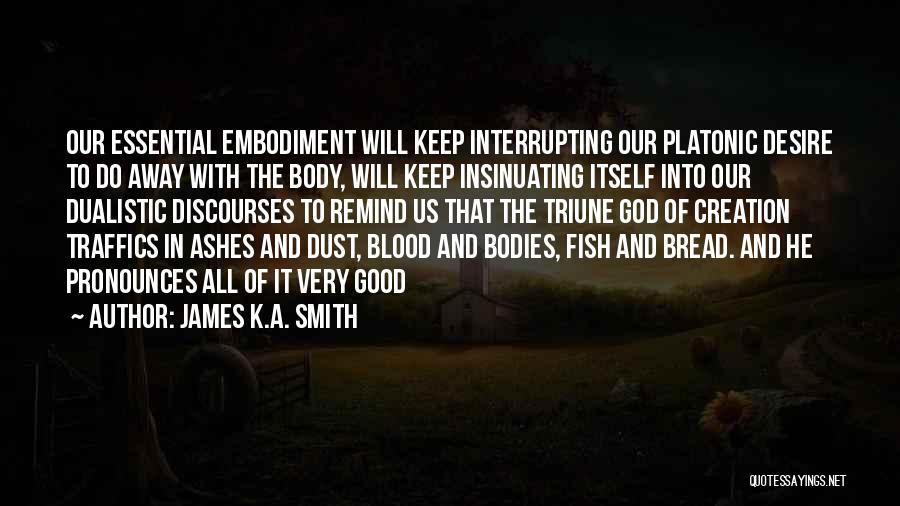
Our essential embodiment will keep interrupting our Platonic desire to do away with the body, will keep insinuating itself into our dualistic discourses to remind us that the triune God of creation traffics in ashes and dust, blood and bodies, fish and bread. And he pronounces all of it very good — James K.A. Smith
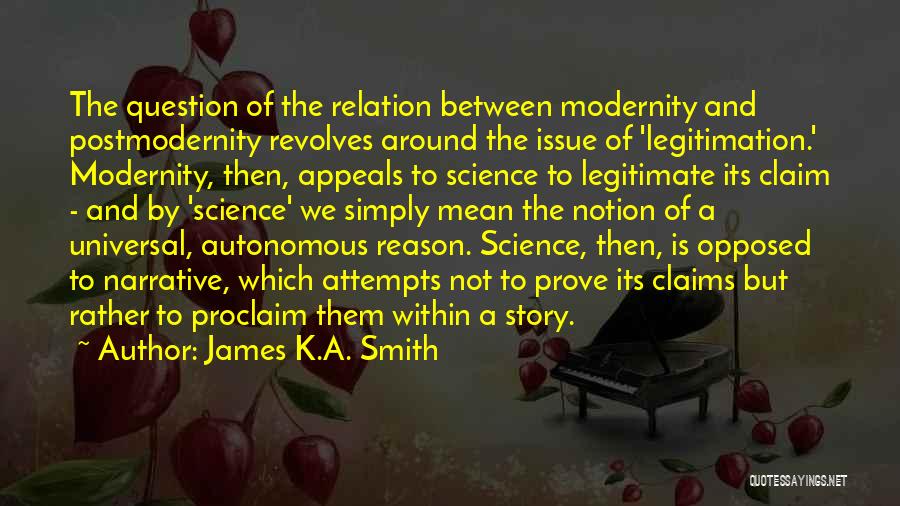
The question of the relation between modernity and postmodernity revolves around the issue of 'legitimation.' Modernity, then, appeals to science to legitimate its claim - and by 'science' we simply mean the notion of a universal, autonomous reason. Science, then, is opposed to narrative, which attempts not to prove its claims but rather to proclaim them within a story. — James K.A. Smith
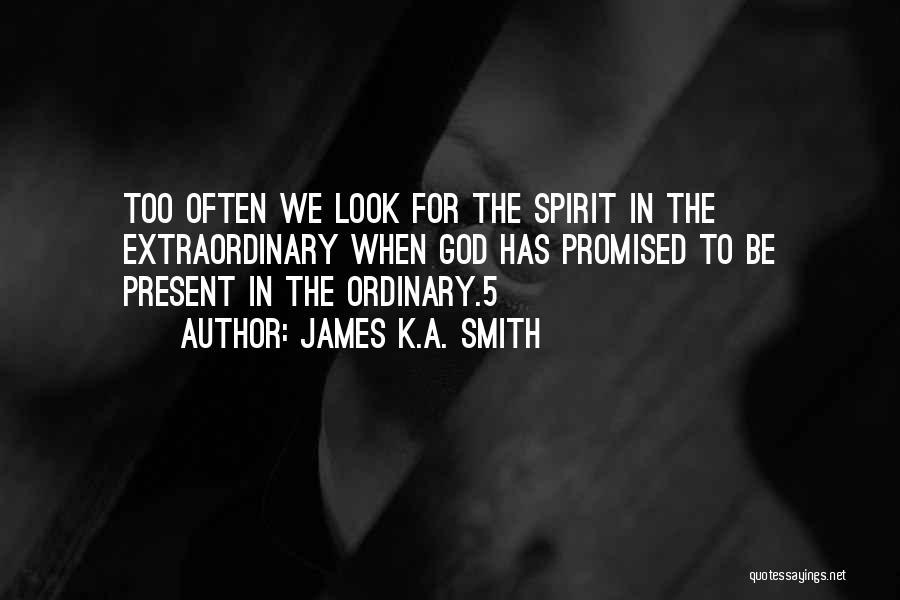
too often we look for the Spirit in the extraordinary when God has promised to be present in the ordinary.5 — James K.A. Smith
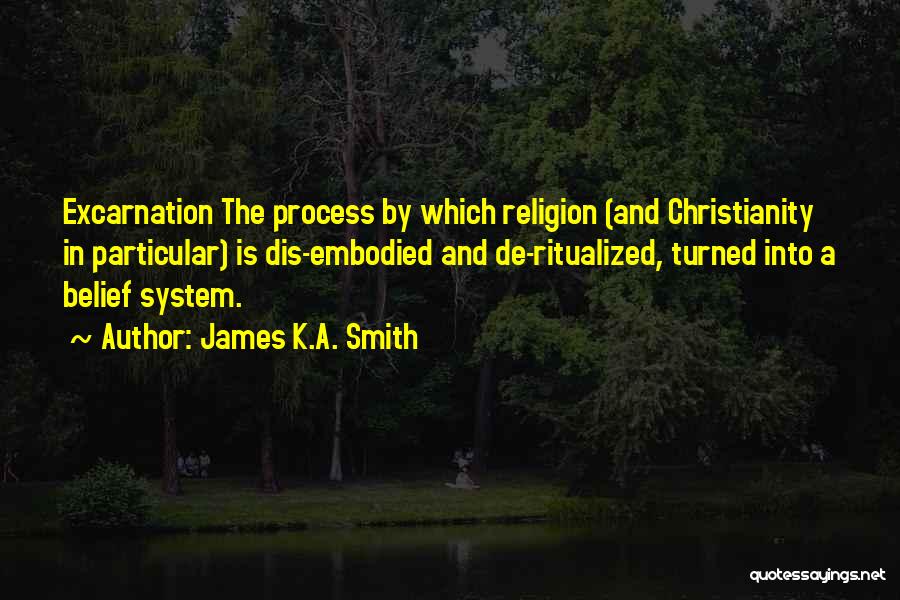
Excarnation The process by which religion (and Christianity in particular) is dis-embodied and de-ritualized, turned into a belief system. — James K.A. Smith
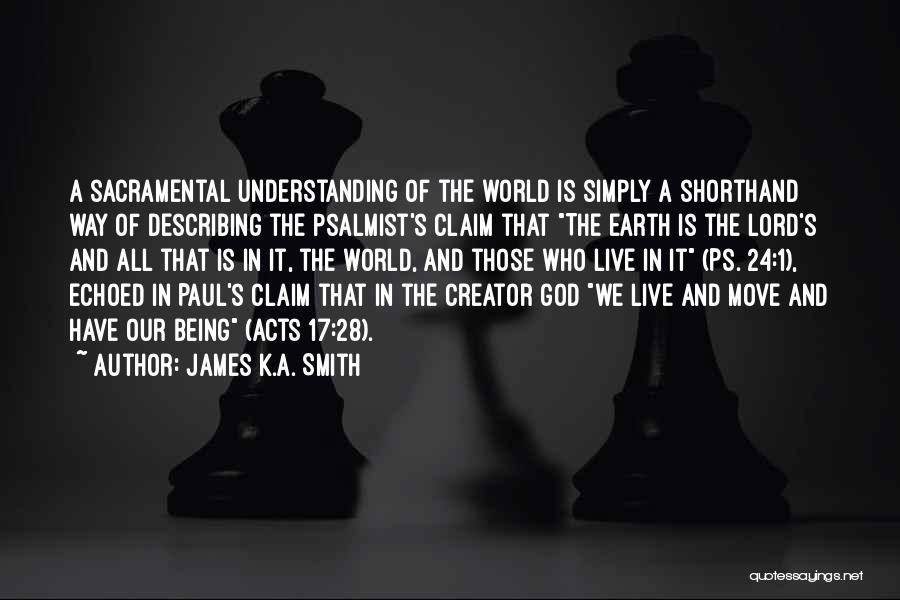
A sacramental understanding of the world is simply a shorthand way of describing the psalmist's claim that "The earth is the Lord's and all that is in it, the world, and those who live in it" (Ps. 24:1), echoed in Paul's claim that in the Creator God "we live and move and have our being" (Acts 17:28). — James K.A. Smith
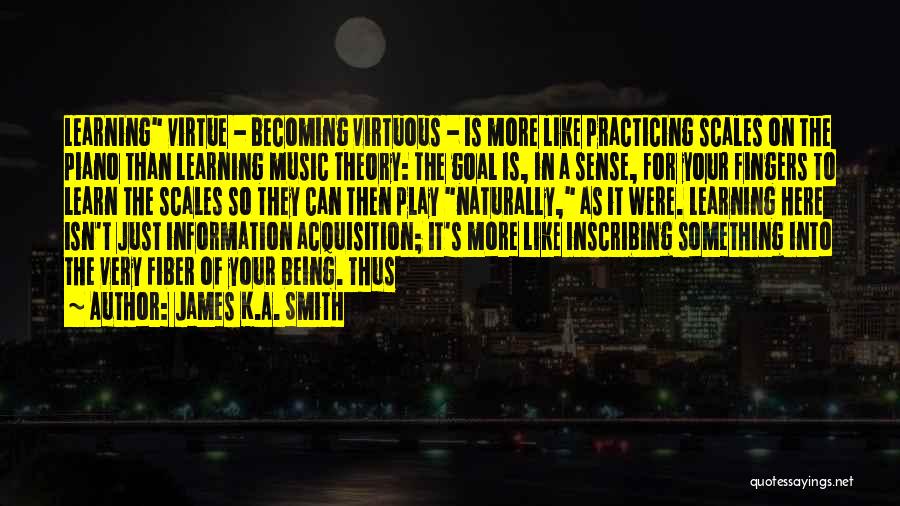
Learning" virtue - becoming virtuous - is more like practicing scales on the piano than learning music theory: the goal is, in a sense, for your fingers to learn the scales so they can then play "naturally," as it were. Learning here isn't just information acquisition; it's more like inscribing something into the very fiber of your being. Thus — James K.A. Smith
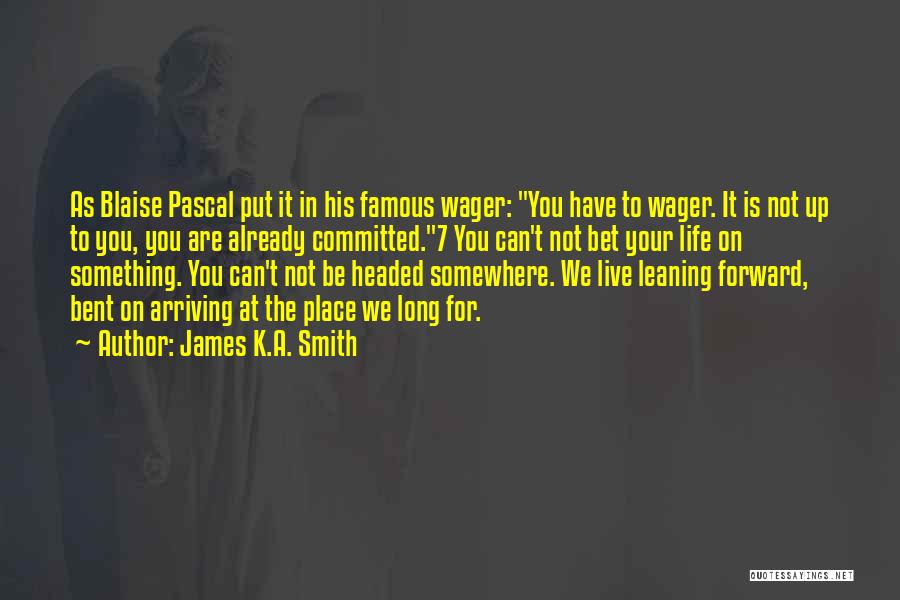
As Blaise Pascal put it in his famous wager: "You have to wager. It is not up to you, you are already committed."7 You can't not bet your life on something. You can't not be headed somewhere. We live leaning forward, bent on arriving at the place we long for. — James K.A. Smith
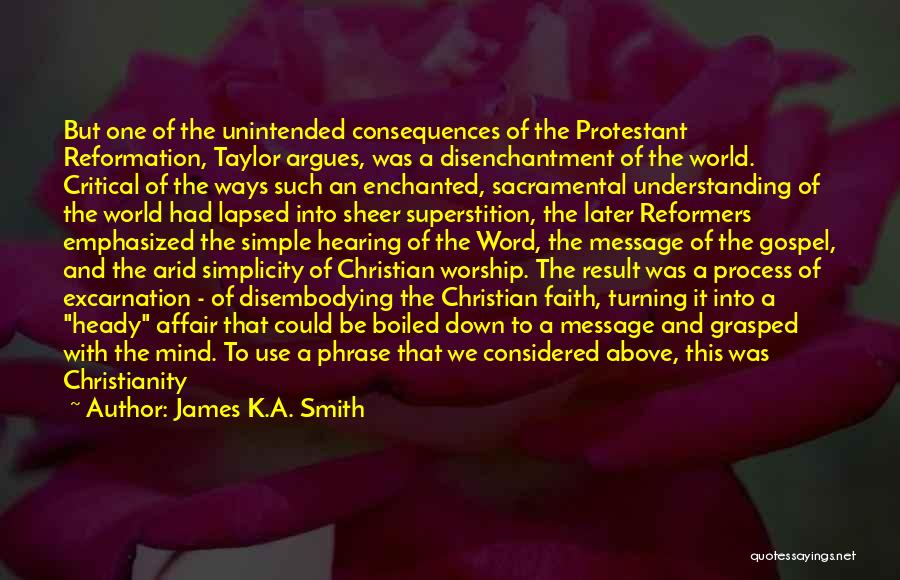
But one of the unintended consequences of the Protestant Reformation, Taylor argues, was a disenchantment of the world. Critical of the ways such an enchanted, sacramental understanding of the world had lapsed into sheer superstition, the later Reformers emphasized the simple hearing of the Word, the message of the gospel, and the arid simplicity of Christian worship. The result was a process of excarnation - of disembodying the Christian faith, turning it into a "heady" affair that could be boiled down to a message and grasped with the mind. To use a phrase that we considered above, this was Christianity reduced to something for brains-on-a-stick. The — James K.A. Smith
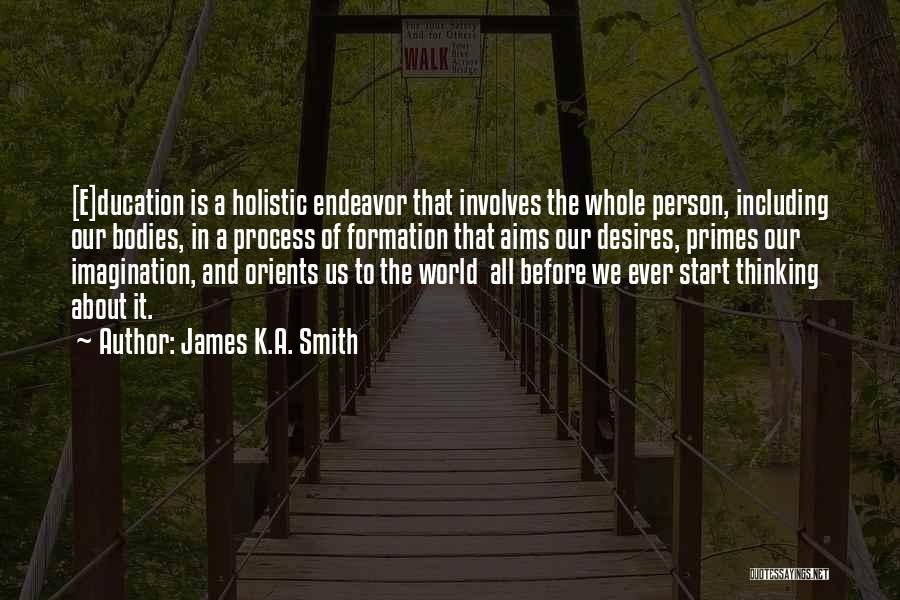
[E]ducation is a holistic endeavor that involves the whole person, including our bodies, in a process of formation that aims our desires, primes our imagination, and orients us to the world
all before we ever start thinking about it. — James K.A. Smith

It is my sense that more of us live in worlds like those portrayed by David Foster Wallace than those mapped by either new atheists or religious fundamentalists. It is this sort of contested, cross-pressured, haunted world that is "secular" - not a world sanitized of faith and transcendence, flattened to the empirical. — James K.A. Smith
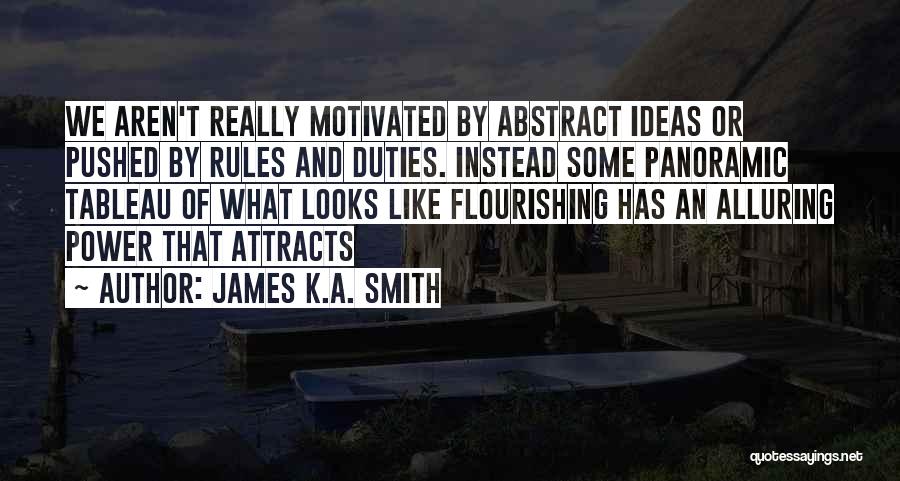
We aren't really motivated by abstract ideas or pushed by rules and duties. Instead some panoramic tableau of what looks like flourishing has an alluring power that attracts — James K.A. Smith
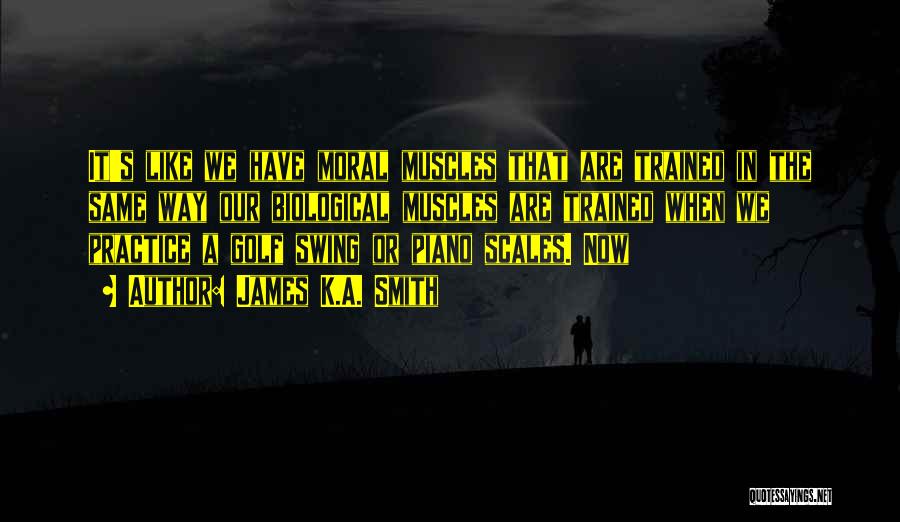
It's like we have moral muscles that are trained in the same way our biological muscles are trained when we practice a golf swing or piano scales. Now — James K.A. Smith
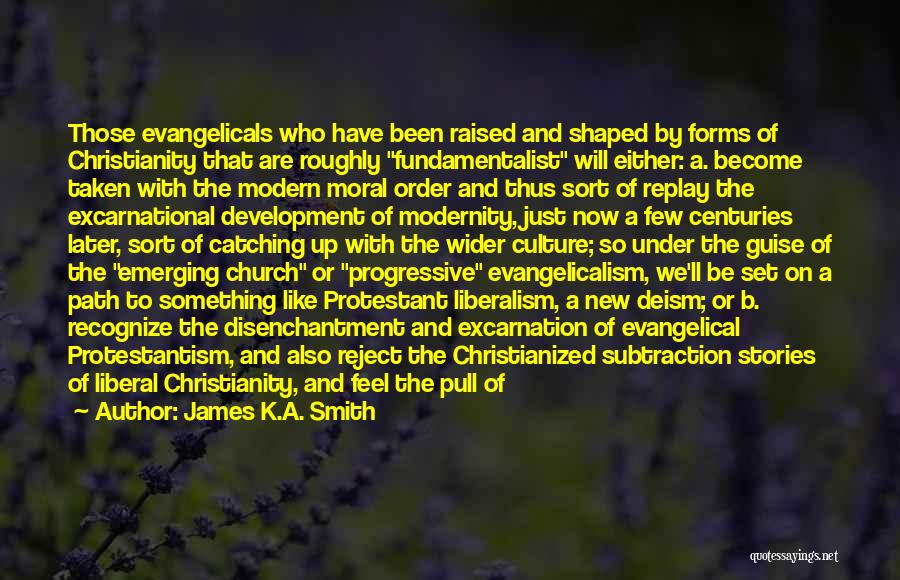
Those evangelicals who have been raised and shaped by forms of Christianity that are roughly "fundamentalist" will either: a. become taken with the modern moral order and thus sort of replay the excarnational development of modernity, just now a few centuries later, sort of catching up with the wider culture; so under the guise of the "emerging church" or "progressive" evangelicalism, we'll be set on a path to something like Protestant liberalism, a new deism; or b. recognize the disenchantment and excarnation of evangelical Protestantism, and also reject the Christianized subtraction stories of liberal Christianity, and feel the pull of more incarnational spiritualities, and thus move toward more "Catholic" expressions of faith - and these expressions of faith will actually exert more pull on those who have doubts about their "closed" take on the immanent frame. — James K.A. Smith
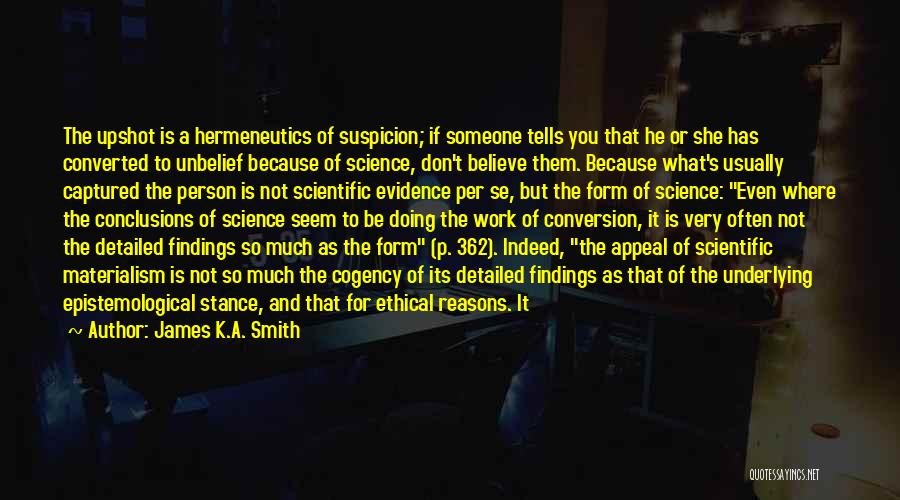
The upshot is a hermeneutics of suspicion; if someone tells you that he or she has converted to unbelief because of science, don't believe them. Because what's usually captured the person is not scientific evidence per se, but the form of science: "Even where the conclusions of science seem to be doing the work of conversion, it is very often not the detailed findings so much as the form" (p. 362). Indeed, "the appeal of scientific materialism is not so much the cogency of its detailed findings as that of the underlying epistemological stance, and that for ethical reasons. It is seen as the stance of maturity, of courage, of manliness, over against childish fears and sentimentality" (p. 365). — James K.A. Smith
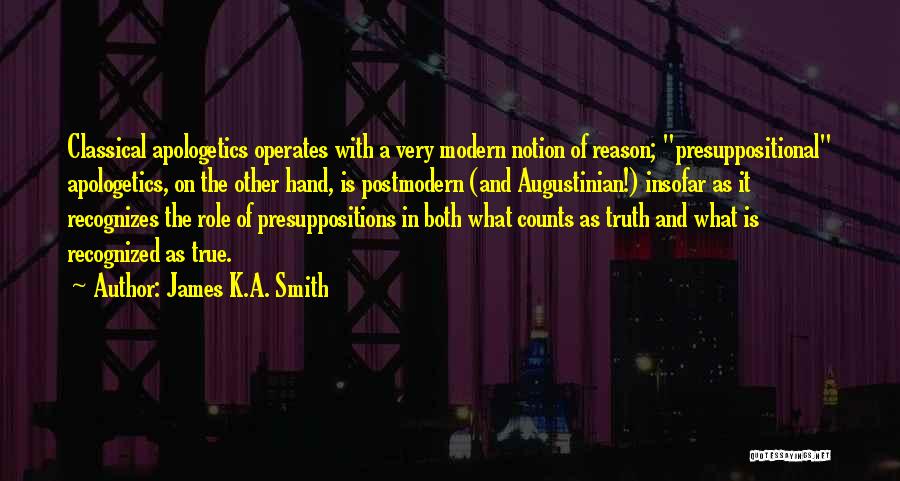
Classical apologetics operates with a very modern notion of reason; "presuppositional" apologetics, on the other hand, is postmodern (and Augustinian!) insofar as it recognizes the role of presuppositions in both what counts as truth and what is recognized as true. — James K.A. Smith
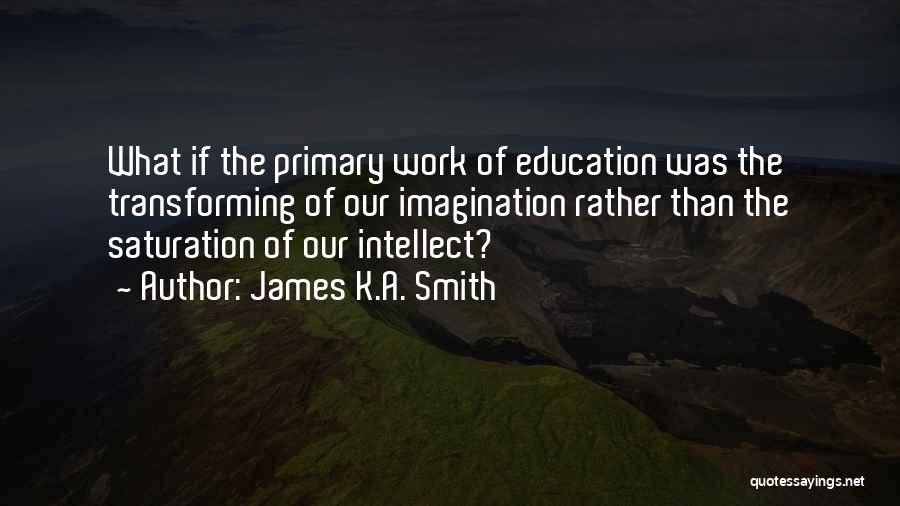
What if the primary work of education was the transforming of our imagination rather than the saturation of our intellect? — James K.A. Smith
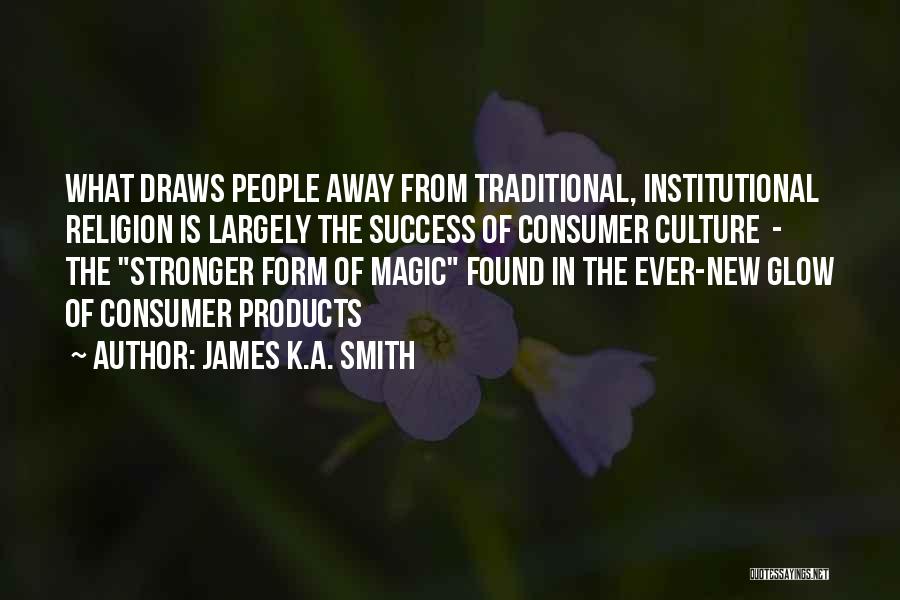
What draws people away from traditional, institutional religion is largely the success of consumer culture - the "stronger form of magic" found in the ever-new glow of consumer products — James K.A. Smith
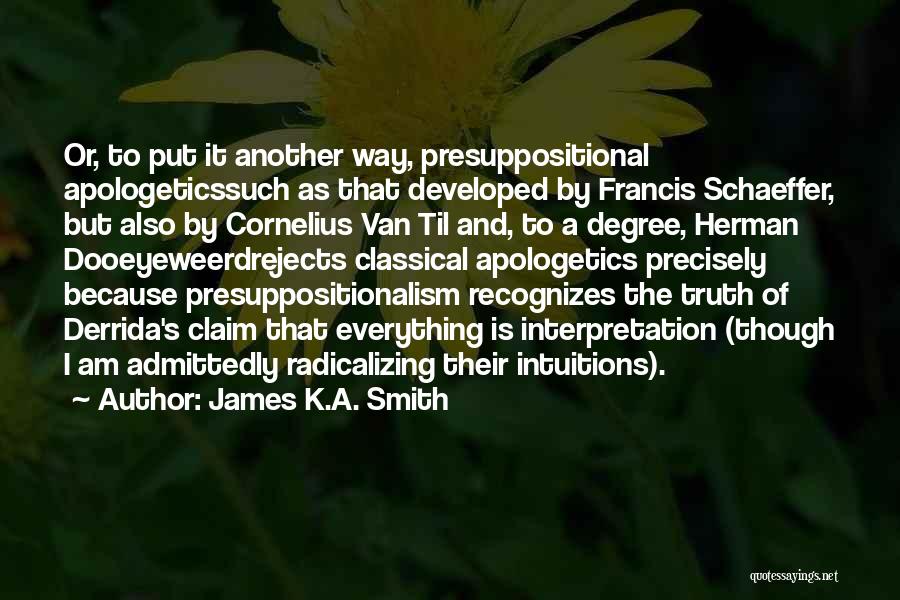
Or, to put it another way, presuppositional apologetics
such as that developed by Francis Schaeffer, but also by Cornelius Van Til and, to a degree, Herman Dooeyeweerd
rejects classical apologetics precisely because presuppositionalism recognizes the truth of Derrida's claim that everything is interpretation (though I am admittedly radicalizing their intuitions). — James K.A. Smith
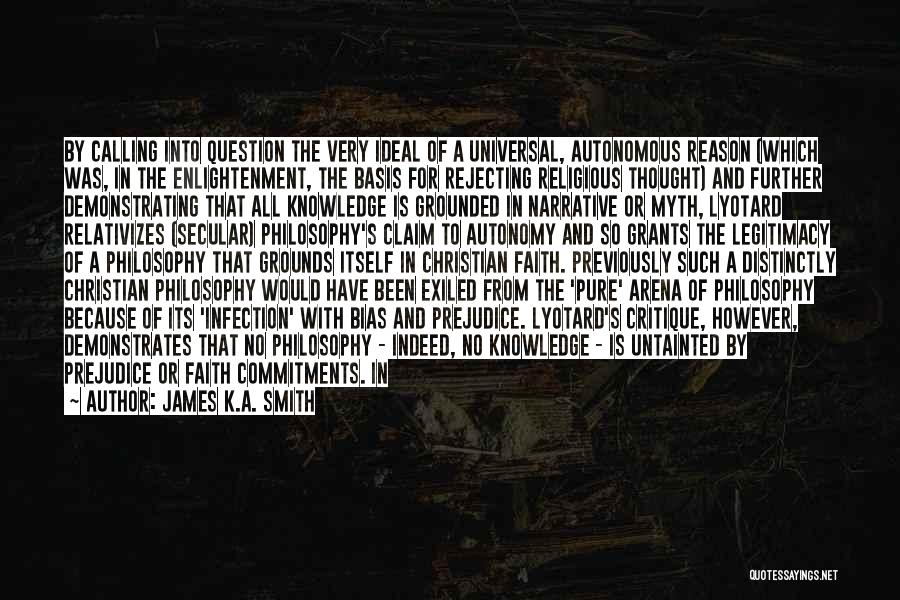
By calling into question the very ideal of a universal, autonomous reason (which was, in the Enlightenment, the basis for rejecting religious thought) and further demonstrating that all knowledge is grounded in narrative or myth, Lyotard relativizes (secular) philosophy's claim to autonomy and so grants the legitimacy of a philosophy that grounds itself in Christian faith. Previously such a distinctly Christian philosophy would have been exiled from the 'pure' arena of philosophy because of its 'infection' with bias and prejudice. Lyotard's critique, however, demonstrates that no philosophy - indeed, no knowledge - is untainted by prejudice or faith commitments. In this way the playing field is leveled, and new opportunities to voice a Christian philosophy are created. Thus Lyotard's postmodern critique of metanarratives, rather than being a formidable foe of Christian faith and thought, can in fact be enlisted as an ally in the construction of a Christian philosophy. — James K.A. Smith
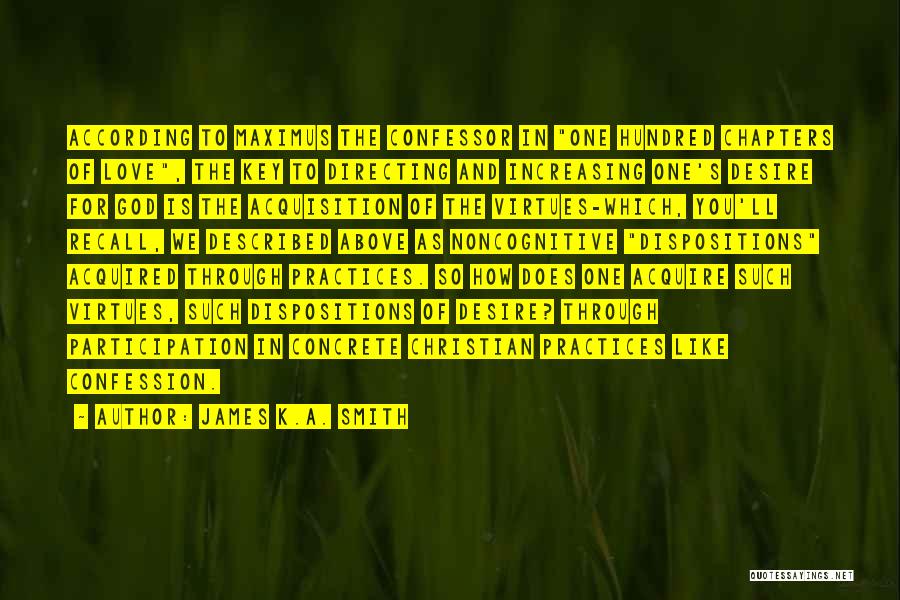
According to Maximus the Confessor in "One Hundred Chapters of Love", the key to directing and increasing one's desire for God is the acquisition of the virtues-which, you'll recall, we described above as noncognitive "dispositions" acquired through practices. So how does one acquire such virtues, such dispositions of desire? Through participation in concrete Christian practices like confession. — James K.A. Smith
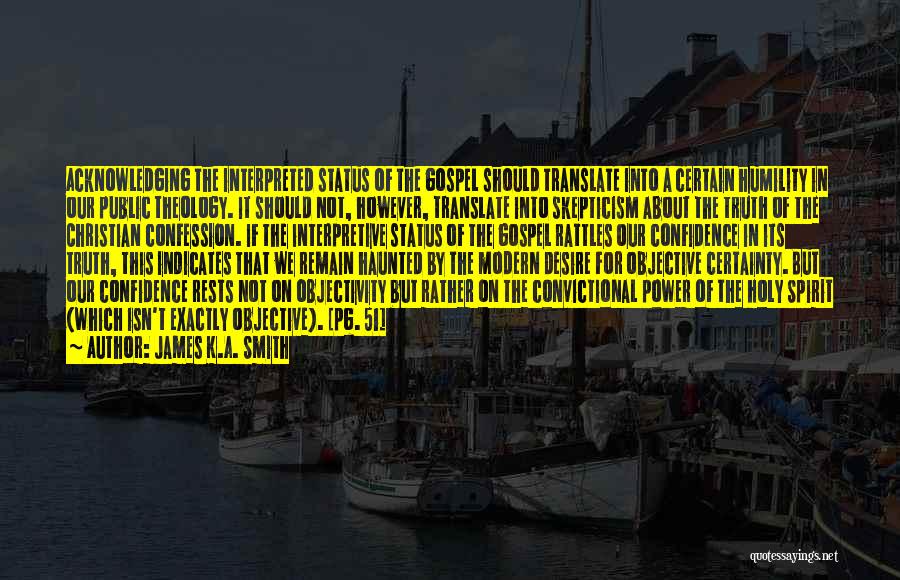
Acknowledging the interpreted status of the gospel should translate into a certain humility in our public theology. It should not, however, translate into skepticism about the truth of the Christian confession. If the interpretive status of the gospel rattles our confidence in its truth, this indicates that we remain haunted by the modern desire for objective certainty. But our confidence rests not on objectivity but rather on the convictional power of the Holy Spirit (which isn't exactly objective). [pg. 51] — James K.A. Smith
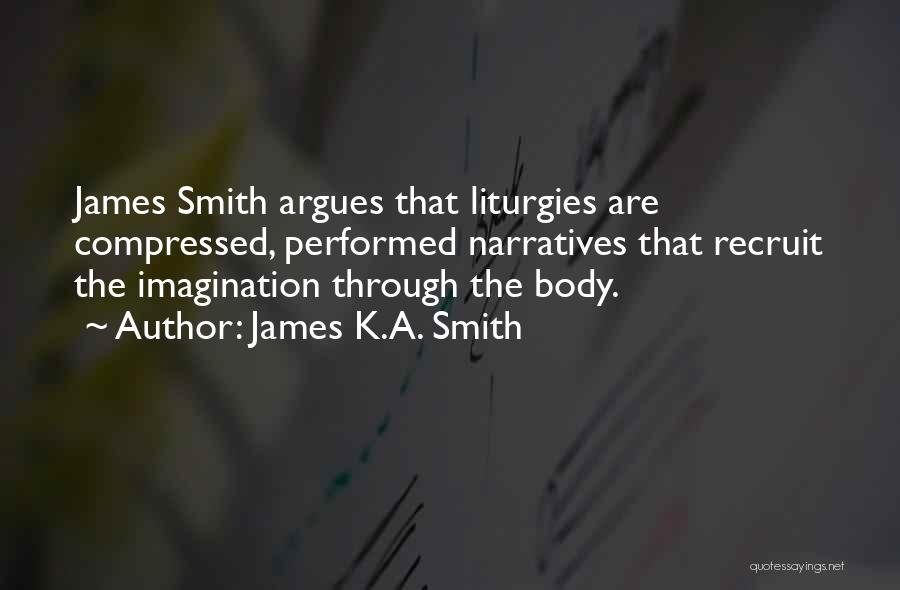
James Smith argues that liturgies are compressed, performed narratives that recruit the imagination through the body. — James K.A. Smith

And I'm looking through the glass Where the light bends at the cracks And I'm screaming at the top of my lungs Pretending the echoes belong to someone - Someone I used to know. — James K.A. Smith

Our ultimate love/desire is shaped by practices, not ideas that are merely communicated to us. — James K.A. Smith
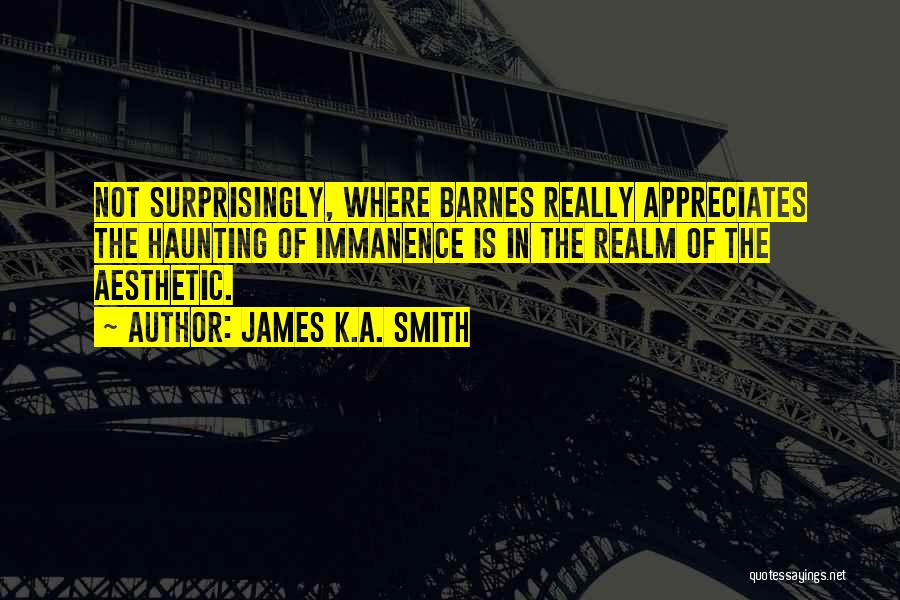
Not surprisingly, where Barnes really appreciates the haunting of immanence is in the realm of the aesthetic. — James K.A. Smith
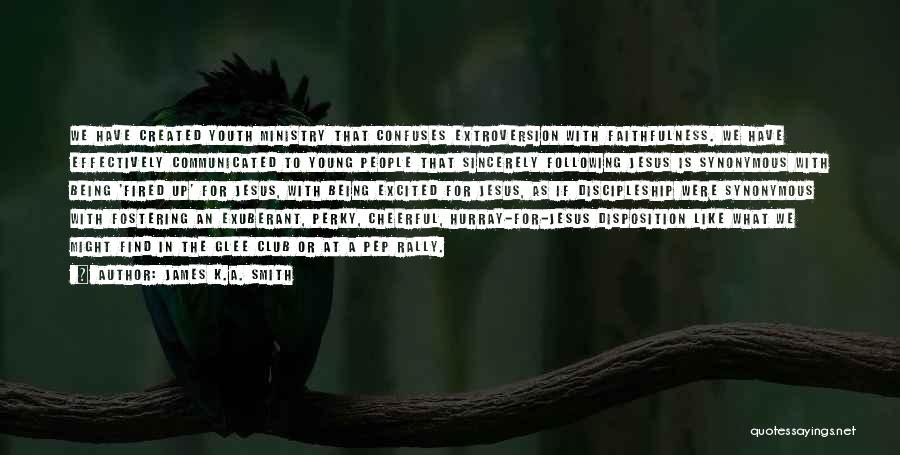
We have created youth ministry that confuses extroversion with faithfulness. We have effectively communicated to young people that sincerely following Jesus is synonymous with being 'fired up' for Jesus, with being excited for Jesus, as if discipleship were synonymous with fostering an exuberant, perky, cheerful, hurray-for-Jesus disposition like what we might find in the glee club or at a pep rally. — James K.A. Smith

But once you realize that we are not just thinking things but creatures of habit, you'll then realize that temptation isn't just about bad ideas or wrong decisions; it's often a factor of de-formation and wrongly ordered habits. In other words, our sins aren't just discrete, wrong actions and bad decisions; they reflect vices.25 And overcoming them requires more than just knowledge; it requires rehabituation, a re-formation of our loves. One — James K.A. Smith
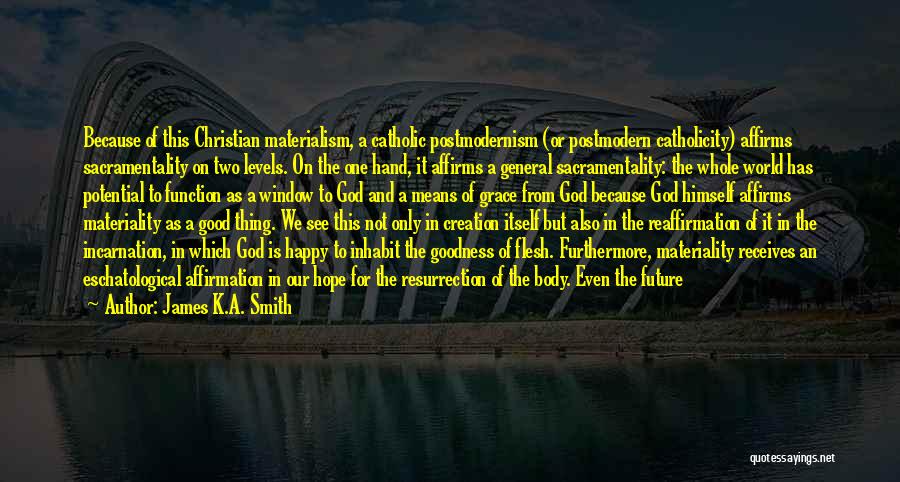
Because of this Christian materialism, a catholic postmodernism (or postmodern catholicity) affirms sacramentality on two levels. On the one hand, it affirms a general sacramentality: the whole world has potential to function as a window to God and a means of grace from God because God himself affirms materiality as a good thing. We see this not only in creation itself but also in the reaffirmation of it in the incarnation, in which God is happy to inhabit the goodness of flesh. Furthermore, materiality receives an eschatological affirmation in our hope for the resurrection of the body. Even the future kingdom will be a material environment of sacramentality. On the other hand, when an incarnational ontology and anthropology are linked with our earlier affirmation of time and tradition, a catholic postmodernism also affirms a special sacramentality - a special presence and means of grace in the sacraments of baptism and Eucharist. — James K.A. Smith
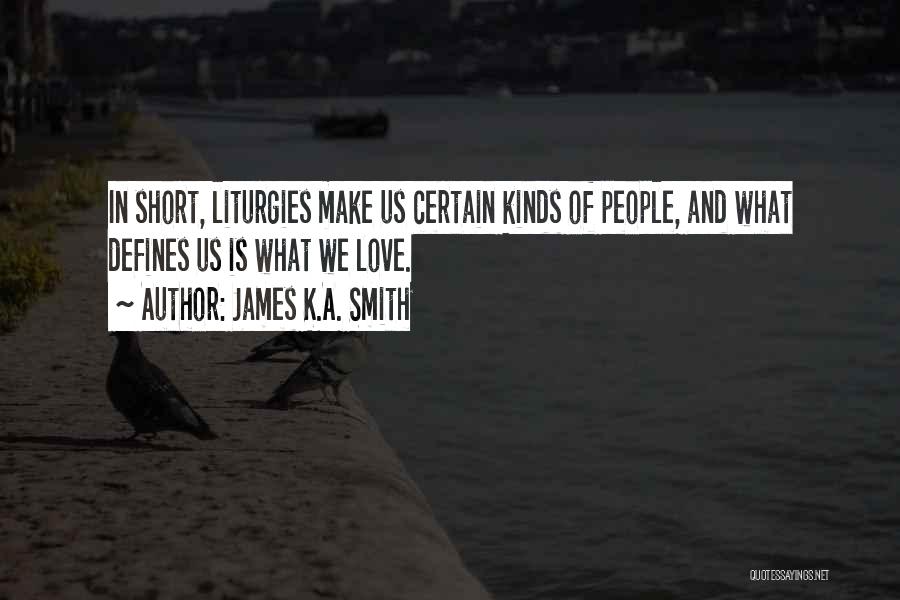
In short, liturgies make us certain kinds of people, and what defines us is what we love. — James K.A. Smith

Because when the thin gruel of do-it-yourself spirituality turns out to be isolating, lonely, and unable to endure crises, the spiritual-but-not-religious crowd might find itself surprisingly open to something entirely different. — James K.A. Smith
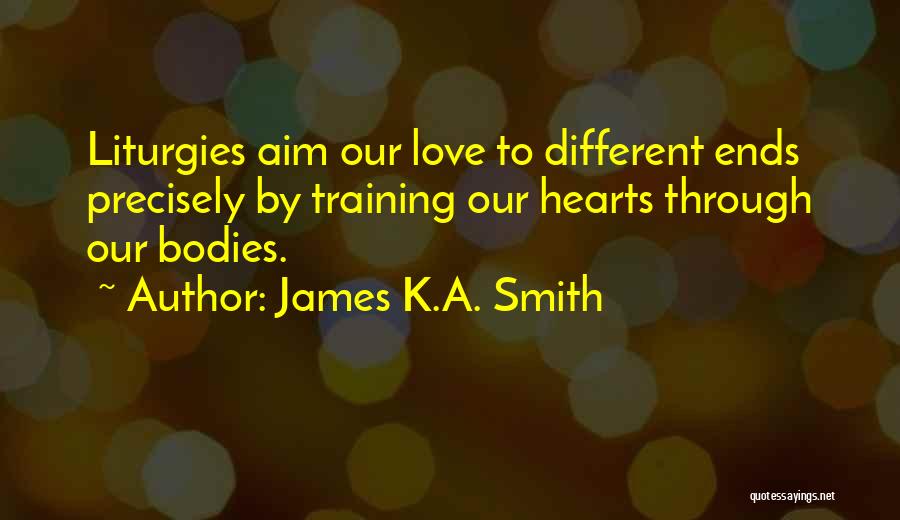
Liturgies aim our love to different ends precisely by training our hearts through our bodies. — James K.A. Smith
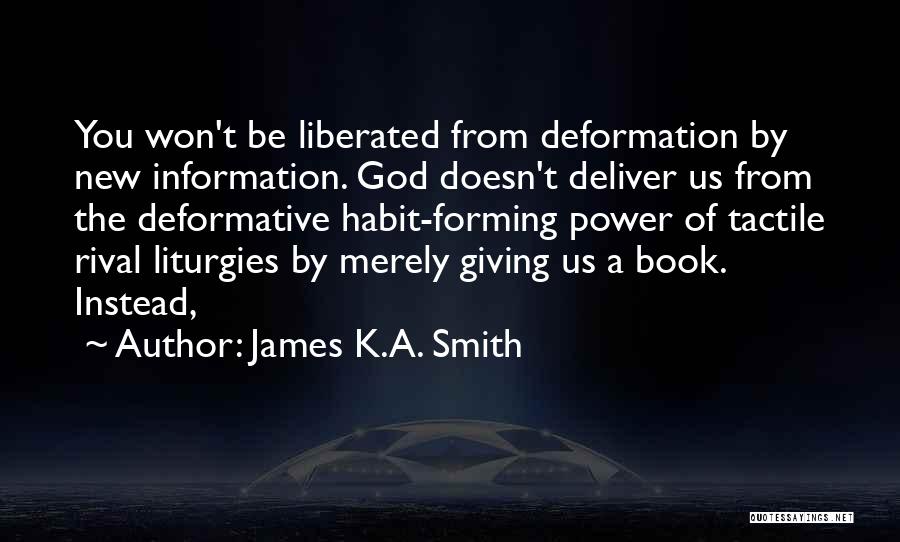
You won't be liberated from deformation by new information. God doesn't deliver us from the deformative habit-forming power of tactile rival liturgies by merely giving us a book. Instead, — James K.A. Smith
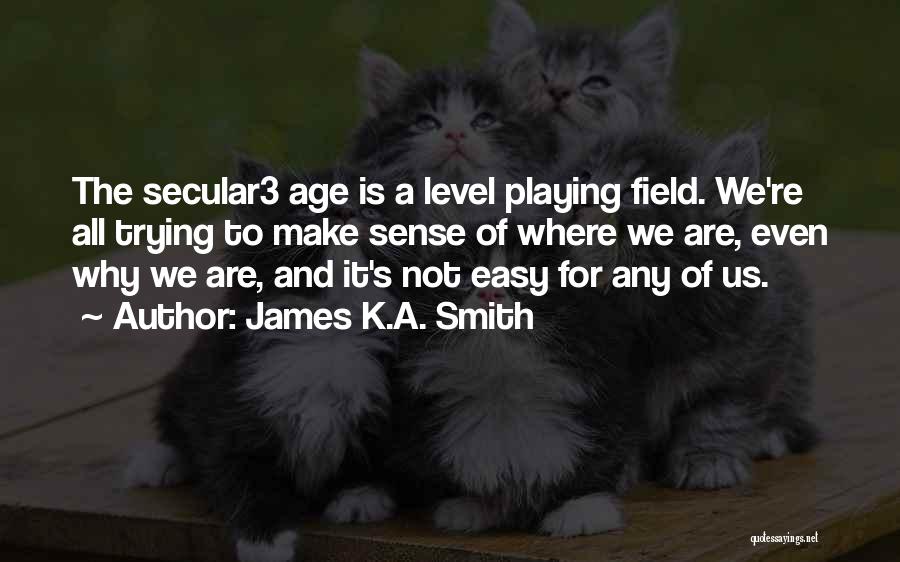
The secular3 age is a level playing field. We're all trying to make sense of where we are, even why we are, and it's not easy for any of us. — James K.A. Smith
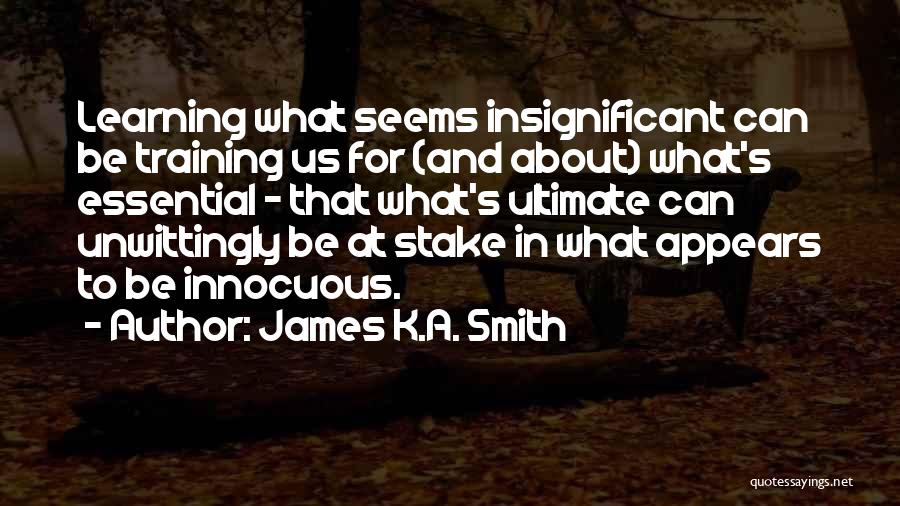
Learning what seems insignificant can be training us for (and about) what's essential - that what's ultimate can unwittingly be at stake in what appears to be innocuous. — James K.A. Smith
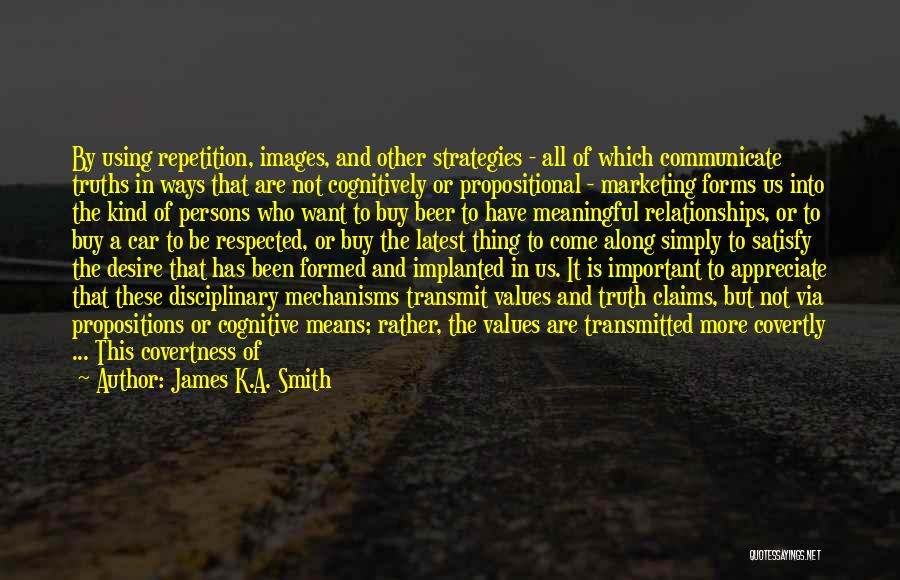
By using repetition, images, and other strategies - all of which communicate truths in ways that are not cognitively or propositional - marketing forms us into the kind of persons who want to buy beer to have meaningful relationships, or to buy a car to be respected, or buy the latest thing to come along simply to satisfy the desire that has been formed and implanted in us. It is important to appreciate that these disciplinary mechanisms transmit values and truth claims, but not via propositions or cognitive means; rather, the values are transmitted more covertly ... This covertness of the operation is also what makes it so powerful: the truths are inscribed in us through the powerful instruments of imagination and ritual. — James K.A. Smith
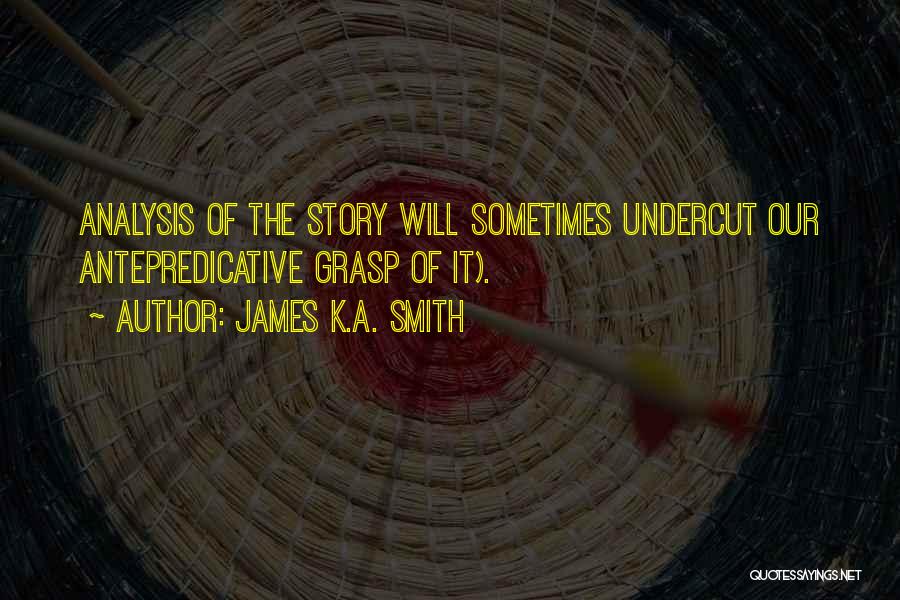
Analysis of the story will sometimes undercut our antepredicative grasp of it). — James K.A. Smith

Jesus is a teacher who doesn't just inform our intellect but forms our very loves. He isn't content to simply deposit new ideas into your mind; he is after nothing less than your wants, your loves, your longings. — James K.A. Smith

Tedium and ennui are the demons of modernity. These haunt us when the routines fail, the narratives dissolve, and time disintegrates (p. 718). — James K.A. Smith
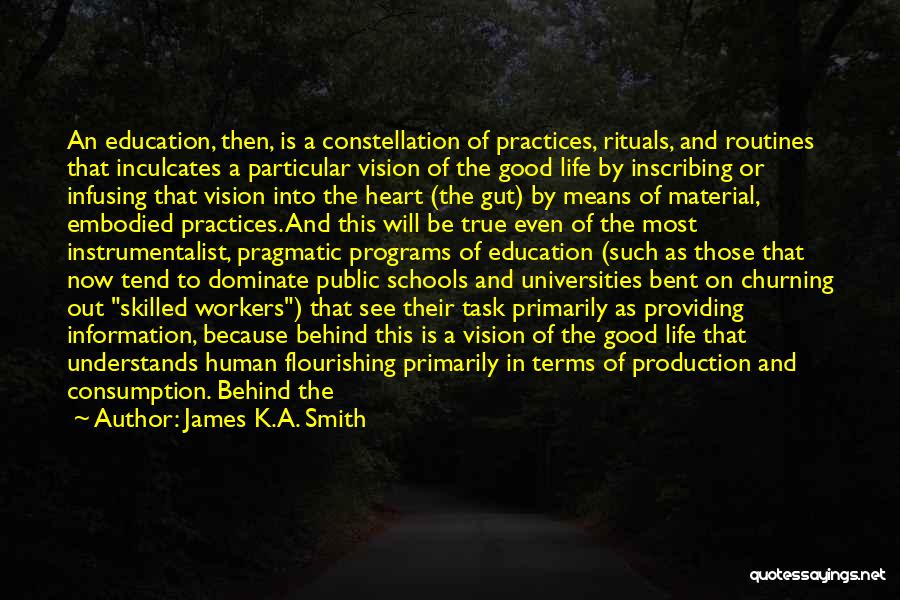
An education, then, is a constellation of practices, rituals, and routines that inculcates a particular vision of the good life by inscribing or infusing that vision into the heart (the gut) by means of material, embodied practices. And this will be true even of the most instrumentalist, pragmatic programs of education (such as those that now tend to dominate public schools and universities bent on churning out "skilled workers") that see their task primarily as providing information, because behind this is a vision of the good life that understands human flourishing primarily in terms of production and consumption. Behind the veneer of a "value-free" education concerned with providing skills, knowledge, and information is an educational vision that remains formative. — James K.A. Smith

Discipline is aimed at formation for a specific end, and that end is determined by our founding narrative. — James K.A. Smith
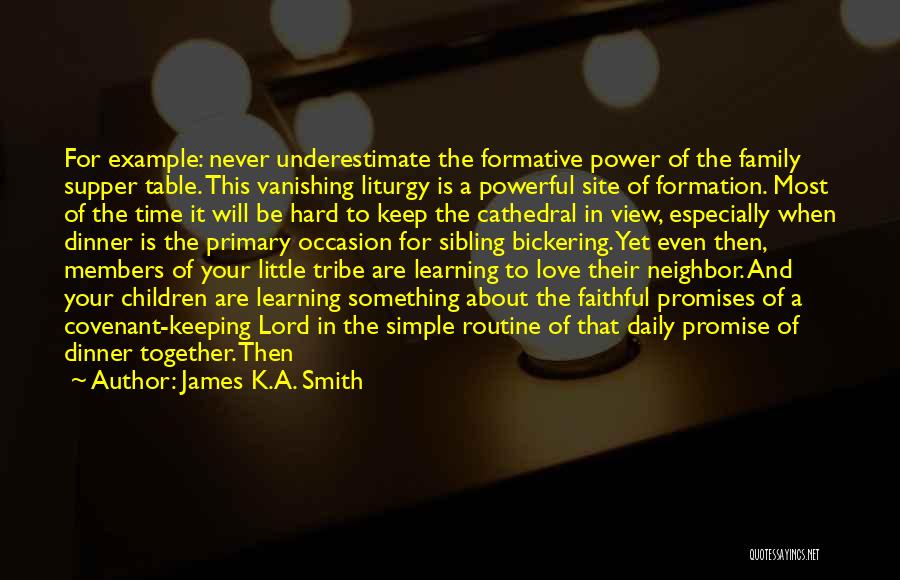
For example: never underestimate the formative power of the family supper table. This vanishing liturgy is a powerful site of formation. Most of the time it will be hard to keep the cathedral in view, especially when dinner is the primary occasion for sibling bickering. Yet even then, members of your little tribe are learning to love their neighbor. And your children are learning something about the faithful promises of a covenant-keeping Lord in the simple routine of that daily promise of dinner together. Then — James K.A. Smith
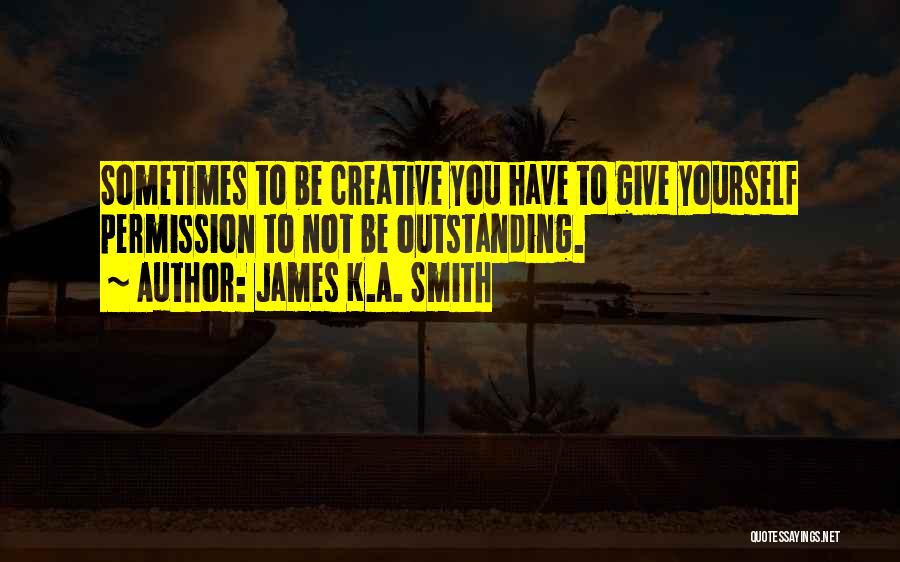
Sometimes to be creative you have to give yourself permission to not be outstanding. — James K.A. Smith
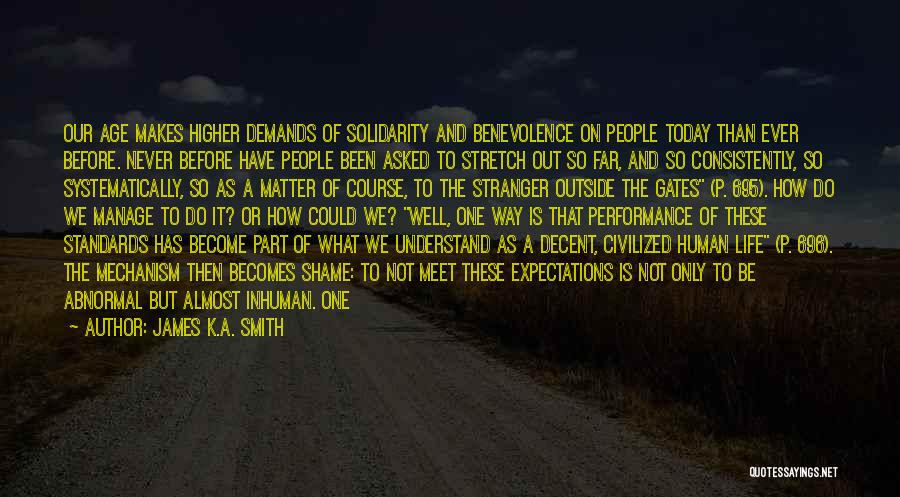
Our age makes higher demands of solidarity and benevolence on people today than ever before. Never before have people been asked to stretch out so far, and so consistently, so systematically, so as a matter of course, to the stranger outside the gates" (p. 695). How do we manage to do it? Or how could we? "Well, one way is that performance of these standards has become part of what we understand as a decent, civilized human life" (p. 696). The mechanism then becomes shame: to not meet these expectations is not only to be abnormal but almost inhuman. One can see this at work in a heightened version of holier-than-Thou: You don't recycle (gasp)? You use plastic shopping bags (horror)? You don't drive a Prius (eek!)? "You won't wear the ribbon?!"44 This has to also be seen in light of Taylor's earlier analysis of the sociality of mutual display and the self-consciousness it generates (pp. 481-82). So what we get is justice chic. — James K.A. Smith

education, then, is a constellation of practices, rituals, and routines that inculcates a particular vision of the good life by inscribing or infusing that vision into the heart (the gut) by means of material, embodied practices. — James K.A. Smith
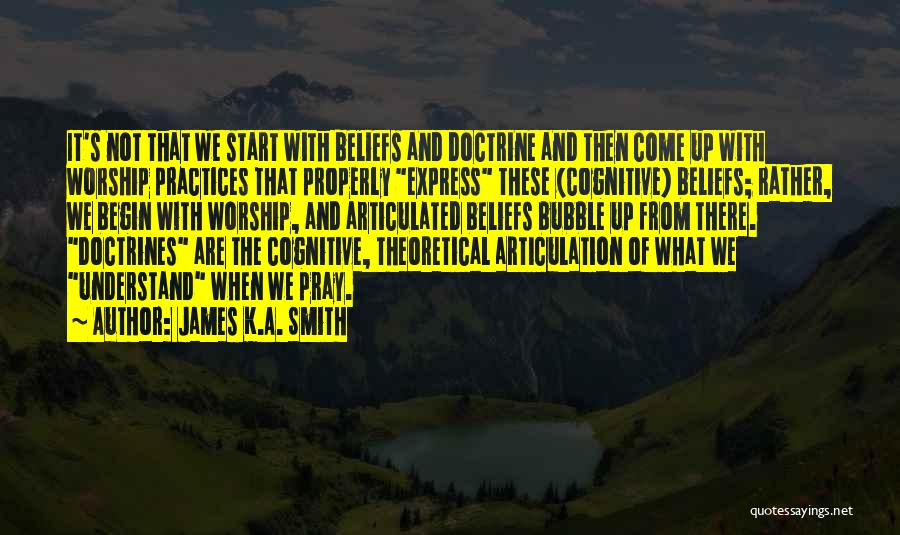
It's not that we start with beliefs and doctrine and then come up with worship practices that properly "express" these (cognitive) beliefs; rather, we begin with worship, and articulated beliefs bubble up from there. "Doctrines" are the cognitive, theoretical articulation of what we "understand" when we pray. — James K.A. Smith
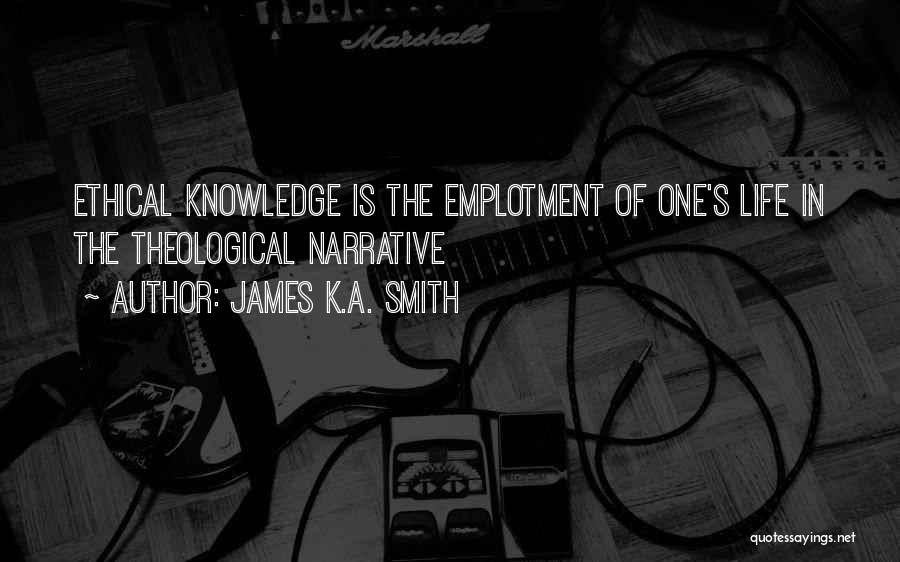
Ethical knowledge is the emplotment of one's life in the theological narrative — James K.A. Smith
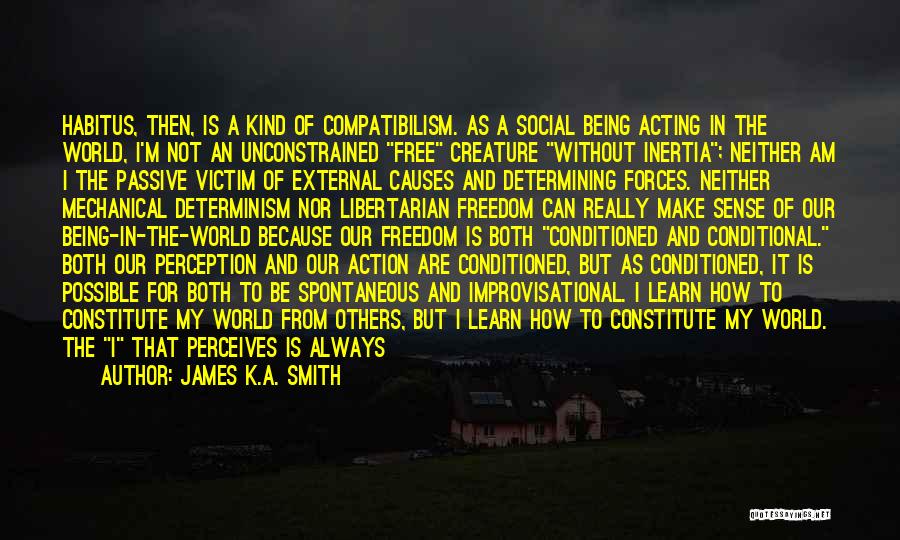
Habitus, then, is a kind of compatibilism. As a social being acting in the world, I'm not an unconstrained "free" creature "without inertia"; neither am I the passive victim of external causes and determining forces. Neither mechanical determinism nor libertarian freedom can really make sense of our being-in-the-world because our freedom is both "conditioned and conditional." Both our perception and our action are conditioned, but as conditioned, it is possible for both to be spontaneous and improvisational. I learn how to constitute my world from others, but I learn how to constitute my world. The "I" that perceives is always already a "we." My — James K.A. Smith
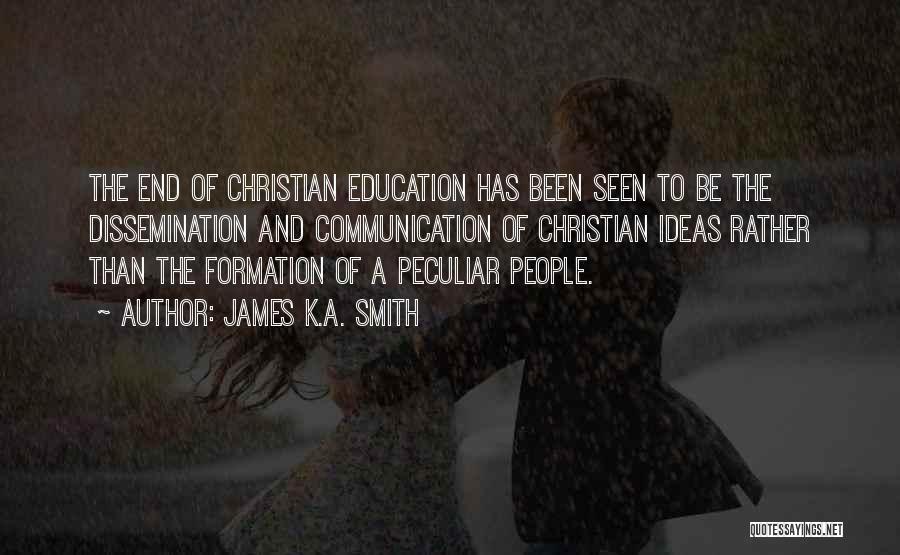
The end of Christian education has been seen to be the dissemination and communication of Christian ideas rather than the formation of a peculiar people. — James K.A. Smith

education is most fundamentally a matter of formation, — James K.A. Smith

The doubter's doubt is faith; his temptation is belief, and it is a temptation that has not been entirely quelled, even in a secular age. — James K.A. Smith

Subtraction stories Accounts that explain "the secular" as merely the subtraction of religious belief, as if the secular is what's left over after we subtract superstition. In contrast, Taylor emphasizes that the secular is produced, not just distilled. — James K.A. Smith
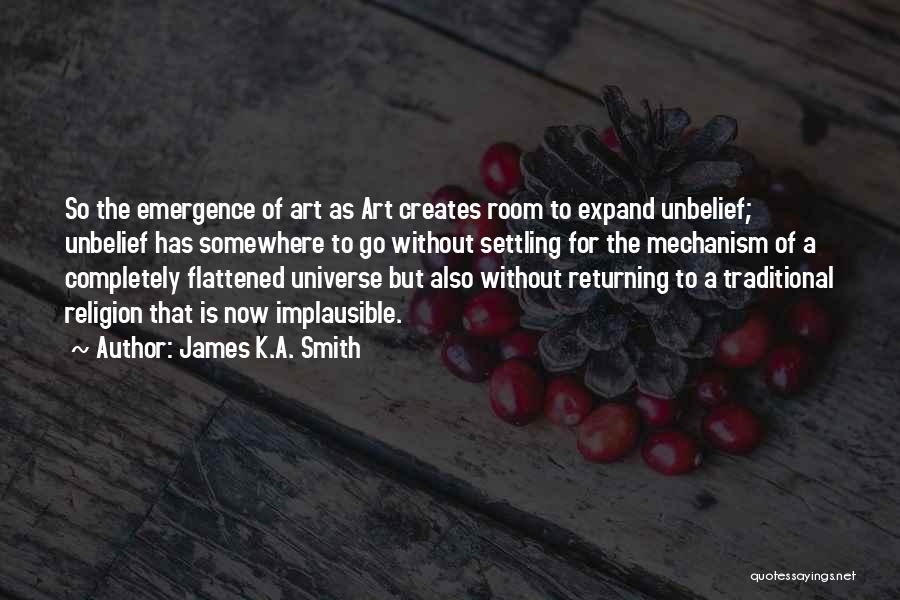
So the emergence of art as Art creates room to expand unbelief; unbelief has somewhere to go without settling for the mechanism of a completely flattened universe but also without returning to a traditional religion that is now implausible. — James K.A. Smith
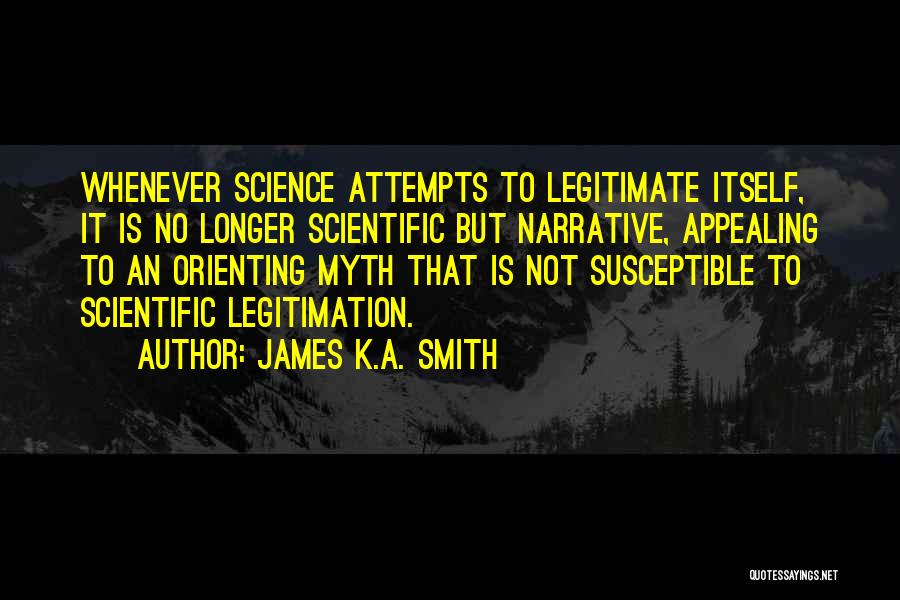
Whenever science attempts to legitimate itself, it is no longer scientific but narrative, appealing to an orienting myth that is not susceptible to scientific legitimation. — James K.A. Smith

worship is not primarily a venue for innovative creativity but a place for discerning reception and faithful repetition. That — James K.A. Smith
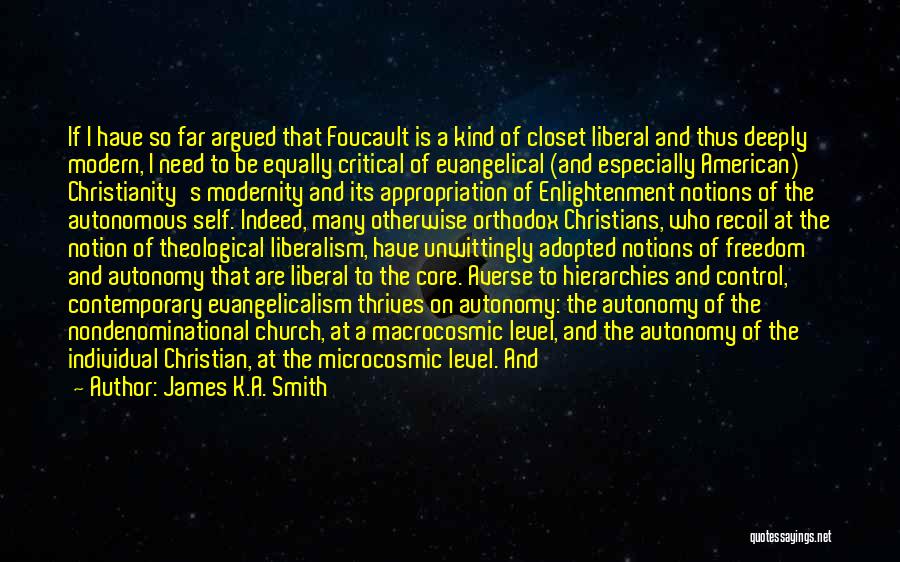
If I have so far argued that Foucault is a kind of closet liberal and thus deeply modern, I need to be equally critical of evangelical (and especially American) Christianity's modernity and its appropriation of Enlightenment notions of the autonomous self. Indeed, many otherwise orthodox Christians, who recoil at the notion of theological liberalism, have unwittingly adopted notions of freedom and autonomy that are liberal to the core. Averse to hierarchies and control, contemporary evangelicalism thrives on autonomy: the autonomy of the nondenominational church, at a macrocosmic level, and the autonomy of the individual Christian, at the microcosmic level. And it does not seem to me that the emerging church has changed much on this score; indeed, some elements of emergent spirituality are intensifications of this affirmation of autonomy and a laissez-faire attitude with respect to institutions. — James K.A. Smith
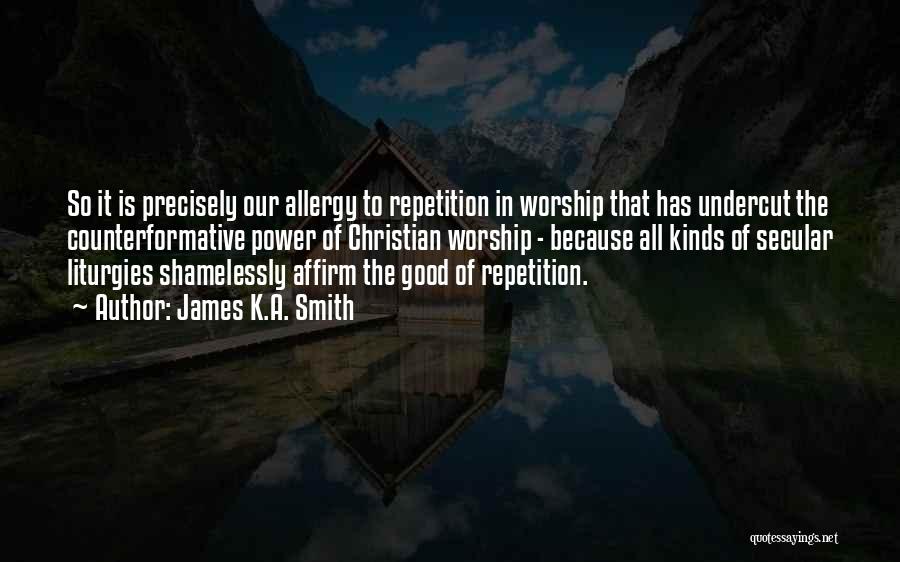
So it is precisely our allergy to repetition in worship that has undercut the counterformative power of Christian worship - because all kinds of secular liturgies shamelessly affirm the good of repetition. — James K.A. Smith
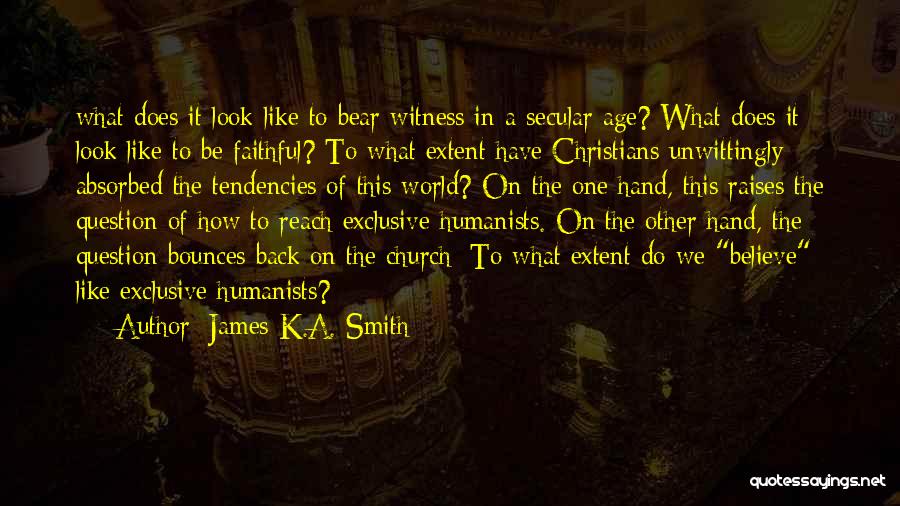
what does it look like to bear witness in a secular age? What does it look like to be faithful? To what extent have Christians unwittingly absorbed the tendencies of this world? On the one hand, this raises the question of how to reach exclusive humanists. On the other hand, the question bounces back on the church: To what extent do we "believe" like exclusive humanists? — James K.A. Smith
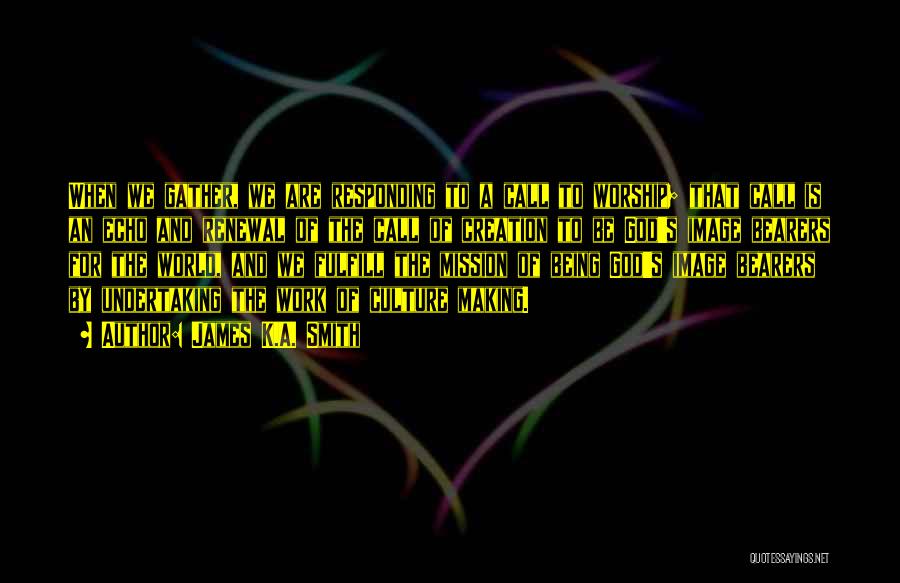
When we gather, we are responding to a call to worship; that call is an echo and renewal of the call of creation to be God's image bearers for the world, and we fulfill the mission of being God's image bearers by undertaking the work of culture making. — James K.A. Smith
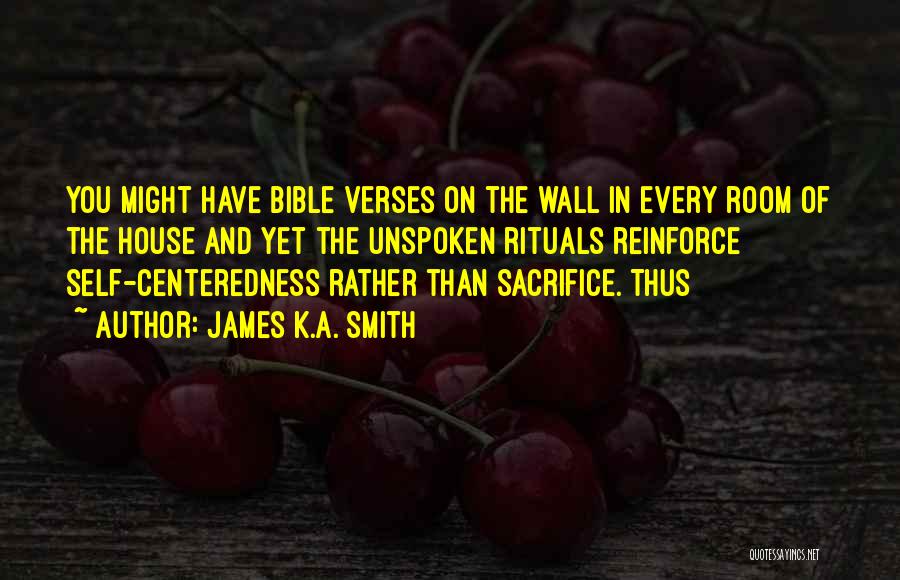
You might have Bible verses on the wall in every room of the house and yet the unspoken rituals reinforce self-centeredness rather than sacrifice. Thus — James K.A. Smith
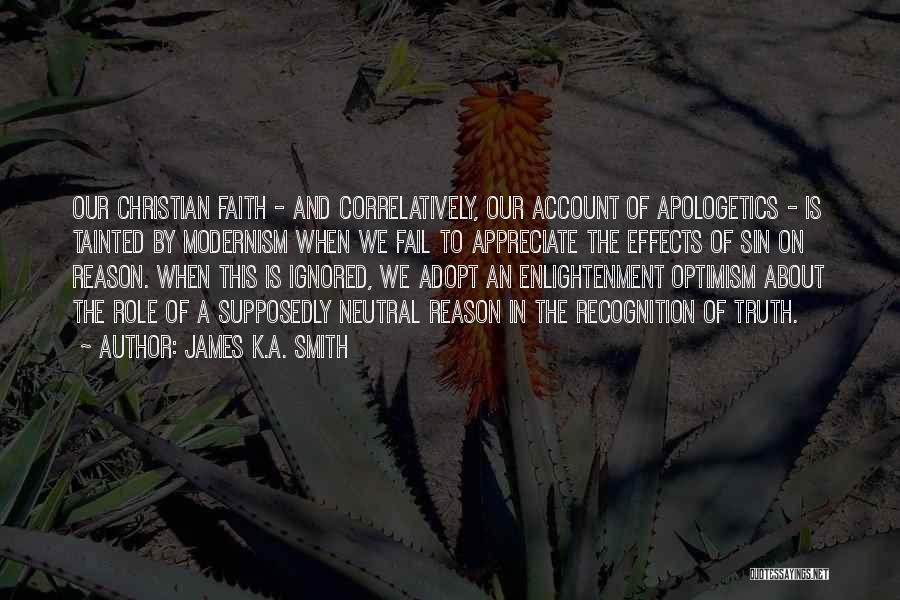
Our Christian faith - and correlatively, our account of apologetics - is tainted by modernism when we fail to appreciate the effects of sin on reason. When this is ignored, we adopt an Enlightenment optimism about the role of a supposedly neutral reason in the recognition of truth. — James K.A. Smith
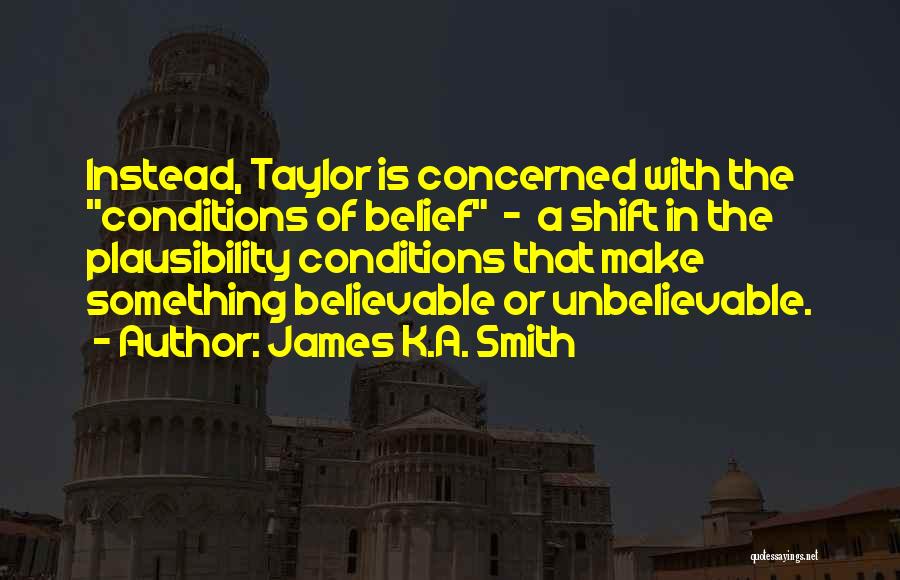
Instead, Taylor is concerned with the "conditions of belief" - a shift in the plausibility conditions that make something believable or unbelievable. — James K.A. Smith

We all - whether naturalists, atheists, Buddhists, or Christians - see the world through the grid of an interpretive framework - and ultimately this interpretive framework is religious in nature, even if not allied with a particular institutional religion. — James K.A. Smith
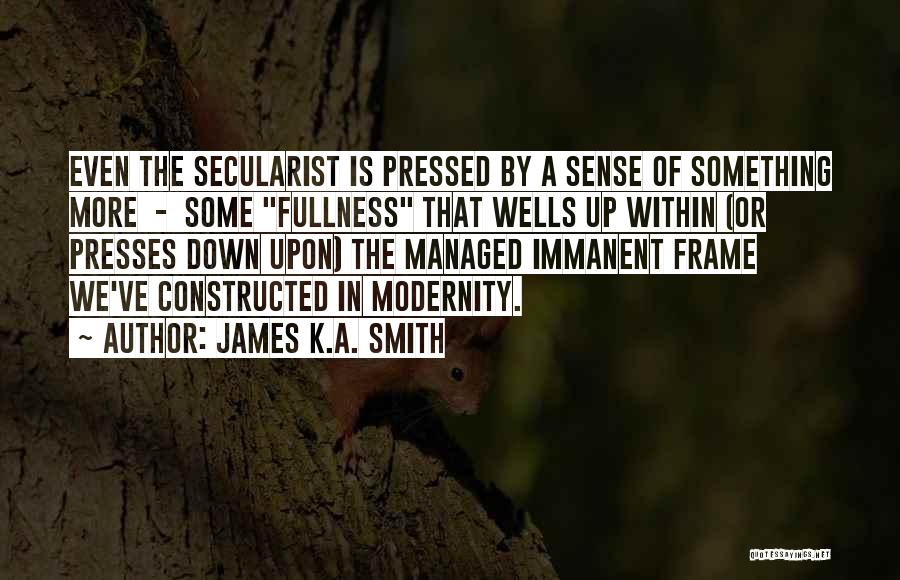
Even the secularist is pressed by a sense of something more - some "fullness" that wells up within (or presses down upon) the managed immanent frame we've constructed in modernity. — James K.A. Smith
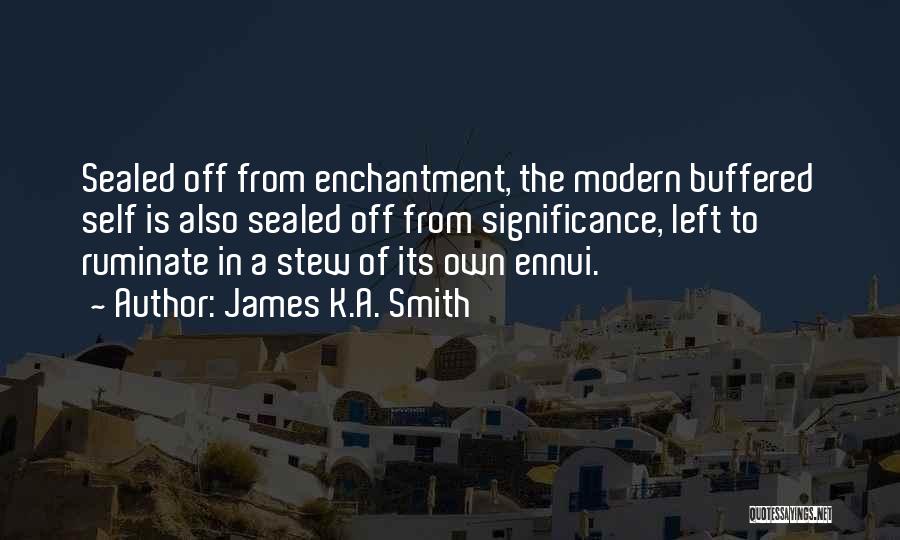
Sealed off from enchantment, the modern buffered self is also sealed off from significance, left to ruminate in a stew of its own ennui. — James K.A. Smith
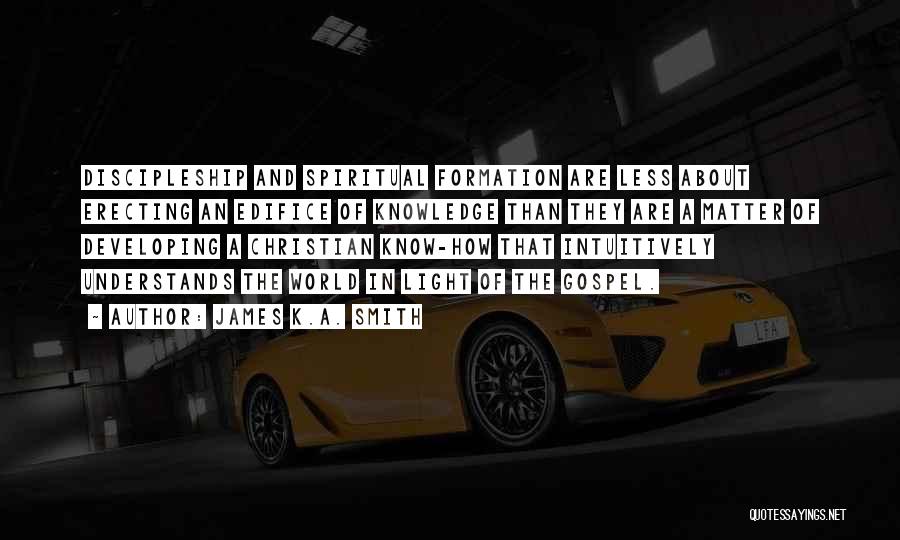
Discipleship and spiritual formation are less about erecting an edifice of knowledge than they are a matter of developing a Christian know-how that intuitively understands the world in light of the Gospel. — James K.A. Smith
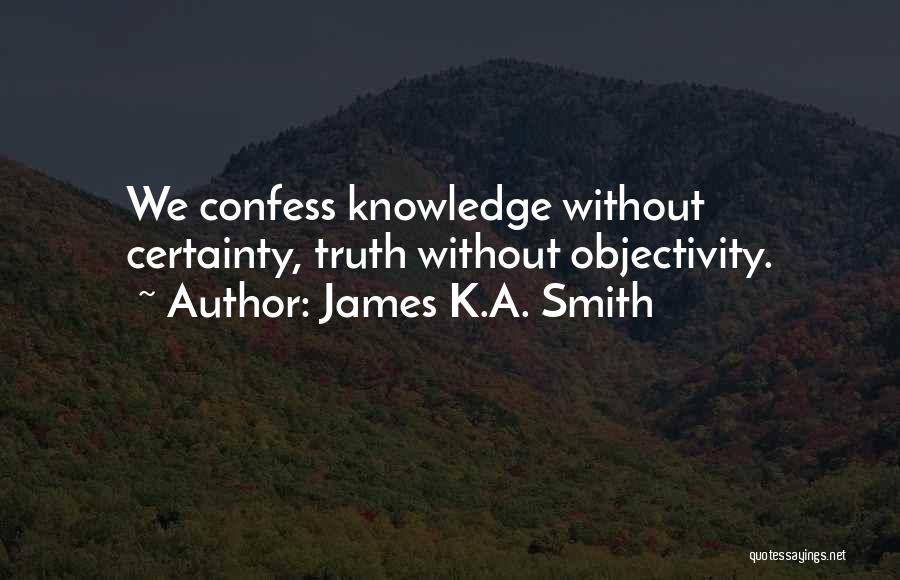
We confess knowledge without certainty, truth without objectivity. — James K.A. Smith
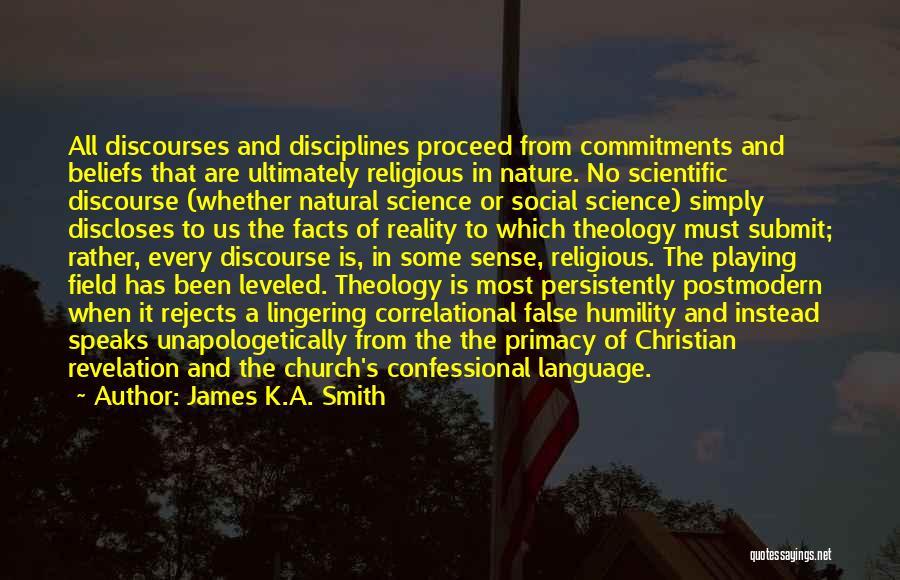
All discourses and disciplines proceed from commitments and beliefs that are ultimately religious in nature. No scientific discourse (whether natural science or social science) simply discloses to us the facts of reality to which theology must submit; rather, every discourse is, in some sense, religious. The playing field has been leveled. Theology is most persistently postmodern when it rejects a lingering correlational false humility and instead speaks unapologetically from the the primacy of Christian revelation and the church's confessional language. — James K.A. Smith





